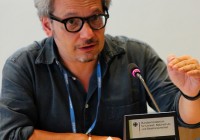Da Barcellona a Milano: un filo comune
Si è appena chiuso il Foro di Barcellona, promosso da Izquierda Unida, Iniciativa Verds Catalunya, Partito della Sinistra Europea, con la partecipazione di varie forze politiche ecologiste, di sinistra e progressiste, tra cui gli European Greens. Viene adottata la dichiarazione comune, nella quale ci si impegna a lavorare insieme per contrastare l’austerità, e rilanciare tra l’altro la Conferenza Europa sul Debito ed un Green New Deal. Una piattaforma comune alla quale anche SEL ha aderito. Dall’Italia eravamo noi, Green Italia, Rifondazione, L’AltraEuropa con Tsipras, Transform!, invitato anche Pippo Civati. Due punti importanti, per sostenere la Grecia, Syriza e non solo e provare a lavorare in rete a casa nostra. Ed ora da Barcellona a Milano per portare a Human Factor le discussioni fatte e le relazioni rafforzate e costruite qua.
In particolare come convergere verso le mobilitazioni di Francoforte del 18 marzo promosse da Blockupy in occasione dell’inaugurazione dell’Eurotower, e per la Conferenza Europea sul debito, tappe importanti per riavviare un processo costituente dal basso verso l’Europa politica. Temi che nel pomeriggio verranno dibattuti all’EuropaLab di Human Factor. Qua a Barcellona in rappresentanza di Sinistra Ecologia Libertà ho raccontato di noi, di Human Factor, del percorso di allargamento e ricostruzione della sinistra per il quale SEL si mette a disposizione, del rapporto tra debito finanziario e debito ecologico, sul costo umano dell’austerity che si ruberà 100 giorni di vita per chi è nato nel 2013, dell’urgenza di fermare l’avanzata della frontiera petrolifera come condizione essenziale per un vero Green New Deal. Ho parlato dell’ipocrisia di un governo, quello italiano, che se da una parte usa parole grosse contro l’austerity, dall’altra sta seguendo passo passo tutte le “condizionalità” poste da Bruxelles. Ho ricordato un’altra faccia del debito, quello umano, di Frontex e delle 25mila persone morte nel Mediterraneo, giacché se da una parte dobbiamo rivolgere il nostro sguardo a Nord, a Bruxelles e Francoforte per contrastare l’austerity e costruire l’Europa politica sulla base della democrazia reale, della giustizia e dei diritti, dall’altra dobbiamo anche rivolgere l’occhio ed il pensiero al nostro Sud. A quello prossimo, il Mare Mediterraneo, ed alla sponda sud, il Maghreb e poi ancor più sotto l’Africa subsahariana perché sarà nel Mediterraneo l’alternativa possibile
Commenti
-
Francesco Martone
 Sinistra Ecologia Libertà
Sinistra Ecologia Libertà








